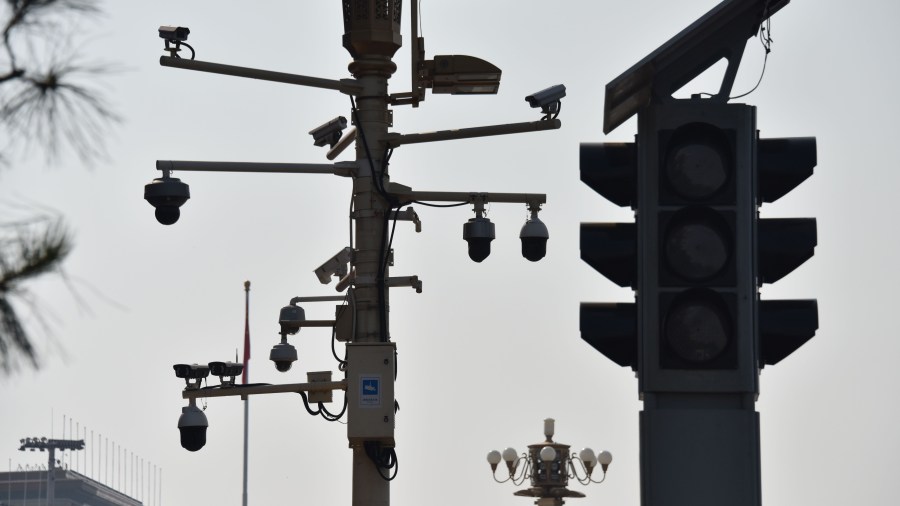The big business of China’s surveillance tech

Earlier this month, the U.S. Commerce Department blacklisted 28 Chinese companies, including a handful of artificial intelligence and security startups, over human rights concerns.
In Hong Kong, protesters have used umbrellas and face masks to avoid cameras and pulled down what they thought was an internet-equipped lamppost to avoid being spied on. Cameras, AI and databases of personal information are used to shame debtholders, track down dissidents and assign people a “social credit” score based on their activities.
This is big business. A global think tank recently reported that China has exported AI surveillance tech to at least 63 countries. I spoke with Jennifer Pak, Marketplace’s China correspondent, and asked her to describe the daily surveillance. The following is an edited transcript of our conversation.
Jennifer Pak: If I walk to work, which is less than half an hour walk, I pass by dozens of cameras at every intersection pointing all different ways. Some of them are equipped with artificial intelligence, so there are certain intersections in the downtown core where they have these screens that try to identify people who are trying to jaywalk, and within moments, you could get a trafficking ticket straight to your cellphone.
Molly Wood: How far could that go in terms of how the government uses this information?
Pak: That’s really the unknown. In 2006, when I first arrived in Beijing, I needed my passport to sign up for the internet, to get onto the train. But in 2015, when I returned, in the southern city of Shenzhen, already the rules had changed drastically. Now I need my passport to buy a SIM card. In Beijing, when we went to a hotel, you need your passport or your ID just to get onto their Wi-Fi. Your social media feeds, like WeChat, and all of your mobile payments, they require what they call real ID registration. I need my passport there as well. All of that is tied together. How much of that information is centralized that they can automatically connect also depends on how badly the authorities want to get at you.
Wood: China’s surveillance apparatus is often held up as what could happen in the United States. And I wonder, from your perspective, having lived both places, do you think that anything at that level could actually occur in the United States, whether it’s the social credit system or cameras everywhere?
Pak: Let’s say Americans are for it. I think it would take a long time to build. The social credit system that they are talking about, the time frame that they were giving to people was 2020 — 2020 is supposed to be just for a basic infrastructure. Even though they have a lot of offline data, it’s going to take a long time to upload. And don’t forget, there are different competing interests within China. Although a lot of the leaders here like to present themselves as the unified voice, in actuality, as you mentioned, it’s a massive country. That’s why when people think, “Oh, it’s coming right now,” it hasn’t arrived yet to the same degree as people are imagining, but it doesn’t mean that it can’t.


Related Links: More insight from Molly Wood
Just last week, Chinese surveillance giant Hikvision said it may lose business because of the U.S. ban on its technology and on U.S. companies doing business with Chinese companies as a result of the trade war. But USA Today had a story last week about how Chinese surveillance tech is still being snapped up in countries that already have poor records on human rights, like Serbia, Turkey, Russia and other countries.
In addition to human rights concerns in those countries, security experts have pointed out that China’s government can compel Chinese companies to hand over data that they collect with their cameras or networking equipment. That leads to concerns about Beijing’s power, both in data and potential influence.
In our interview, Jennifer Pak also mentioned that the huge databases of information about every Chinese citizen could also be a massive boon to companies developing artificial intelligence there. It can be hard for companies in places like the U.S. to come by datasets that big to help train the machines.
The future of this podcast starts with you.
Every day, the “Marketplace Tech” team demystifies the digital economy with stories that explore more than just Big Tech. We’re committed to covering topics that matter to you and the world around us, diving deep into how technology intersects with climate change, inequity, and disinformation.
As part of a nonprofit newsroom, we’re counting on listeners like you to keep this public service paywall-free and available to all.
Support “Marketplace Tech” in any amount today and become a partner in our mission.















